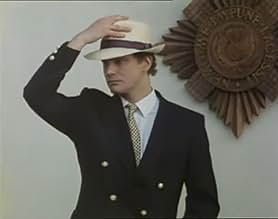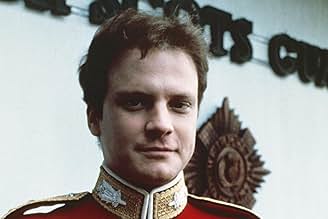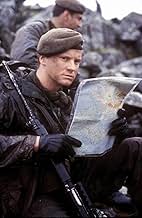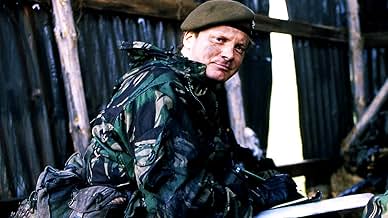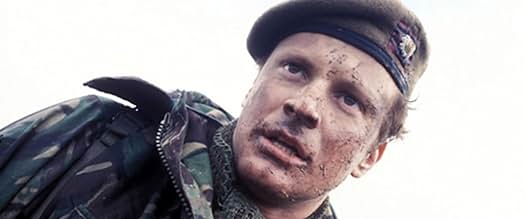- Won 3 BAFTA Awards
- 5 wins & 6 nominations total
Emma Bowe
- Sophie Martin-Wells
- (as Emma Harbour)
- Director
- Writer
- All cast & crew
- Production, box office & more at IMDbPro
Storyline
Did you know
- TriviaBased on the experiences of Lieutenant Robert Lawrence MC.
- GoofsTowards the end of the film, Firth is shown wearing a panama hat behind some guardsmen in full dress. They are welcoming a coach load of other guardsmen in combat dress. Those on parade in full dress, have their buttons singly and a white plume on the right side of their bearskins. This would indicate that they were Grenadier Guards. As such, surely the plume should be on the left side of the bearskin.
- Quotes
[an RAF doctor is giving Robert yet more tests]
Squadron Leader Wentworth: Your father gave me a lesson in military etiquette. I shall give you one. I am called "Sir".
Robert Lawrence: What are you? Squadron Leader? In the Household Division we don't call your rank "Sir".
Squadron Leader Wentworth: Well you can start now, Lawrence.
Robert Lawrence: You're in the Royal Air Force. Are you a flyer?
Squadron Leader Wentworth: No I'm not. I'm a doctor.
Robert Lawrence: [snarls] Well listen, Doctor. Just test this fist. It's just about to give you your first fucking flying lesson!
- ConnectionsFeatured in When TV Goes to War (2011)
Featured review
Just as much of the controversy over the political rights and wrongs of the Falklands War had dissipated, the BBC managed to bring them back very much into the public domain with this no-holds-barred but realistic dramatisation of the experiences of Royal Scots Guard Lieutenant Robert Lawrence, covering his military training, the fateful action he saw in the Falklands conflict and the aftermath of the terrible injuries which he sustained.
The themes running through the film have been dealt with many times before and many since - the futility and barbarity of war, the way in which jack-the-lad trainees react to the true horrors of battle, the notion that the atrocities of war are very much the result of the reaction of its protagonists to the death of colleagues around them, the `kill or be killed' reality. What most war films have failed to do, though, and which is effectively achieved here, is to marry the harsh realities of the battlefield with the equally harsh realities of the social readjustment of the returning soldiers, particularly the seriously injured ones. Unlike the early Marlon Brando vehicle "The Men" or the highly-acclaimed 1946 drama "The Best Years of Our Lives", we are actually party to the battlefield horrors, both physical and mental, from which the subjects must recover, as a result of which we have fresh understanding of the traumas from which recovery is required. Those aforementioned films deal only with the ways in which the veterans deal with the problems of readjustment to everyday life within the constraints of their injuries, states of mind and social and economic rejection. On the other hand, the classic "All Quiet on the Western Front"and Oliver Stone's "Platoon" deal only with the realities of war on the battlefield. The picture that comes closest to achieving the wider effect of "Tumbledown" is undoubtedly "Born on the Fourth of July", a film also based on a real-life case (that of Vietnam veteran Ron Kovik), whose responses to his experiences and injuries (a campaign to end the war in Vietnam) are much more widely-based than the more personal agenda of Robert Lawrence.
There is no doubt that Lawrence (and, indeed, writer Charles Wood and director Richard Eyre) vehemently believes that the fight over a barren and distant group of islands was not worth the price paid in terms of life and limb. But Lawrence is (and remains through all his adversities) a devoted and loyal professional soldier. He lays the burden of blame on everybody (the politicians who instigated the conflict, the heirarchy of the armed forces who persistently fail to recognise their responsibilty towards him and, unjustifiably in this case, the medical professionals who try to mend his mind and body) - all except the sniper who shot him. His bitterness towards all of these is because he perceives them as failing in their duty to him. His lack of bitterness towards the sniper is by virtue of the fact that he acknowledges him as a true professional soldier was was merely doing his job. He had done the same in similar circumstances, to which his bayoneting to death of the Argentinian soldier in a particularly nasty battle scene attests. Why couldn't everybody else have acted with the same professional attitude and with the same honour that he, his colleagues and the enemy had done? It appears that the only honour a soldier can have is to die gloriously on the battlefield - not to suffer horrendous woundings that leave him as a liability and embarrassment to the military, political and social leaders that had sent him to battle.
Lawrence is not a particularly likeable chap, either during his training, during his difficult rehabilitation or in his bitter recounting of his experiences to his friend's parents - here Firth does an excellent job in portraying an individual with whom he has accepted in interview he would have found it very difficult to have made friends on a personal level. What makes his performance all the more remarkable is that, despite the brashness, self-righteousness and downright insolence of the character at times, the viewer still feels genuine sympathy for the circumstances of Lawrence's plight, if not for Lawrence himself.
The format of the film also helps to drive home the points that it attempts to make. The events unfold in the form of apparently random flashbacks whilst Lawrence relates the story of his experiences to the parents of a close colleague. These flashbacks cover the Guards' training and the build-up to their despatch to the South Atlantic, the injury to Lawrence and his subsequent removal from the battlefield,through the various stages of his treatment, recovery and recuperation to the reactions of his family and friends and the battle scenes which culminate in his injury. Each linking flashback is chosen to increase the impact of the previous or forthcoming sequence, a technique which may appear to give rise to a disjointed narrative, but which is nevertheless highly effective in retaining the viewer's attention and making him wonder what the next fade will bring.
Through all this, Colin Firth's portrayal of Robert Lawrence shines out like a beacon. His performance is truly remarkable in its range and its ability to provoke emotional response in the viewer. It was a part which undoubtedly increased his profile as a serious actor capable of producing credible and powerful pieces of acting and which lifted him to close to star status in both costume drama (BBC TV's "Pride and Prejudice" and the Oscar-winning "Shakespeare in Love") and contemporaneous tales ("Fever Pitch" and "Hostages"). Around him, there are some equally impressive support performances, particularly by the quietly reliable David Calder as Lawrence's father and Paul Rhys as his army colleague and closest friend. And director Eyre excels in his treatment of both the dramatic scenes and the action on the battle fields. Lastly, any critique of the piece would be incomplete without a tribute to the terrific screenplay of Charles Wood who has adapted Robert Lawrence's story with style, intelligence and brutal honesty to provide, through the personal experiences of a badly injured war veteran, an intense insight not only into the highly-publicised controversies surrounding the circumstances of the Falklands conflict, but also the more easily overlooked background issues at stake.
The themes running through the film have been dealt with many times before and many since - the futility and barbarity of war, the way in which jack-the-lad trainees react to the true horrors of battle, the notion that the atrocities of war are very much the result of the reaction of its protagonists to the death of colleagues around them, the `kill or be killed' reality. What most war films have failed to do, though, and which is effectively achieved here, is to marry the harsh realities of the battlefield with the equally harsh realities of the social readjustment of the returning soldiers, particularly the seriously injured ones. Unlike the early Marlon Brando vehicle "The Men" or the highly-acclaimed 1946 drama "The Best Years of Our Lives", we are actually party to the battlefield horrors, both physical and mental, from which the subjects must recover, as a result of which we have fresh understanding of the traumas from which recovery is required. Those aforementioned films deal only with the ways in which the veterans deal with the problems of readjustment to everyday life within the constraints of their injuries, states of mind and social and economic rejection. On the other hand, the classic "All Quiet on the Western Front"and Oliver Stone's "Platoon" deal only with the realities of war on the battlefield. The picture that comes closest to achieving the wider effect of "Tumbledown" is undoubtedly "Born on the Fourth of July", a film also based on a real-life case (that of Vietnam veteran Ron Kovik), whose responses to his experiences and injuries (a campaign to end the war in Vietnam) are much more widely-based than the more personal agenda of Robert Lawrence.
There is no doubt that Lawrence (and, indeed, writer Charles Wood and director Richard Eyre) vehemently believes that the fight over a barren and distant group of islands was not worth the price paid in terms of life and limb. But Lawrence is (and remains through all his adversities) a devoted and loyal professional soldier. He lays the burden of blame on everybody (the politicians who instigated the conflict, the heirarchy of the armed forces who persistently fail to recognise their responsibilty towards him and, unjustifiably in this case, the medical professionals who try to mend his mind and body) - all except the sniper who shot him. His bitterness towards all of these is because he perceives them as failing in their duty to him. His lack of bitterness towards the sniper is by virtue of the fact that he acknowledges him as a true professional soldier was was merely doing his job. He had done the same in similar circumstances, to which his bayoneting to death of the Argentinian soldier in a particularly nasty battle scene attests. Why couldn't everybody else have acted with the same professional attitude and with the same honour that he, his colleagues and the enemy had done? It appears that the only honour a soldier can have is to die gloriously on the battlefield - not to suffer horrendous woundings that leave him as a liability and embarrassment to the military, political and social leaders that had sent him to battle.
Lawrence is not a particularly likeable chap, either during his training, during his difficult rehabilitation or in his bitter recounting of his experiences to his friend's parents - here Firth does an excellent job in portraying an individual with whom he has accepted in interview he would have found it very difficult to have made friends on a personal level. What makes his performance all the more remarkable is that, despite the brashness, self-righteousness and downright insolence of the character at times, the viewer still feels genuine sympathy for the circumstances of Lawrence's plight, if not for Lawrence himself.
The format of the film also helps to drive home the points that it attempts to make. The events unfold in the form of apparently random flashbacks whilst Lawrence relates the story of his experiences to the parents of a close colleague. These flashbacks cover the Guards' training and the build-up to their despatch to the South Atlantic, the injury to Lawrence and his subsequent removal from the battlefield,through the various stages of his treatment, recovery and recuperation to the reactions of his family and friends and the battle scenes which culminate in his injury. Each linking flashback is chosen to increase the impact of the previous or forthcoming sequence, a technique which may appear to give rise to a disjointed narrative, but which is nevertheless highly effective in retaining the viewer's attention and making him wonder what the next fade will bring.
Through all this, Colin Firth's portrayal of Robert Lawrence shines out like a beacon. His performance is truly remarkable in its range and its ability to provoke emotional response in the viewer. It was a part which undoubtedly increased his profile as a serious actor capable of producing credible and powerful pieces of acting and which lifted him to close to star status in both costume drama (BBC TV's "Pride and Prejudice" and the Oscar-winning "Shakespeare in Love") and contemporaneous tales ("Fever Pitch" and "Hostages"). Around him, there are some equally impressive support performances, particularly by the quietly reliable David Calder as Lawrence's father and Paul Rhys as his army colleague and closest friend. And director Eyre excels in his treatment of both the dramatic scenes and the action on the battle fields. Lastly, any critique of the piece would be incomplete without a tribute to the terrific screenplay of Charles Wood who has adapted Robert Lawrence's story with style, intelligence and brutal honesty to provide, through the personal experiences of a badly injured war veteran, an intense insight not only into the highly-publicised controversies surrounding the circumstances of the Falklands conflict, but also the more easily overlooked background issues at stake.
Details
- Release date
- Country of origin
- Language
- Also known as
- Der Dank des Vaterlandes
- Production company
- See more company credits at IMDbPro
Contribute to this page
Suggest an edit or add missing content

Top Gap
What is the broadcast (satellite or terrestrial TV) release date of Tumbledown (1988) in Australia?
Answer
